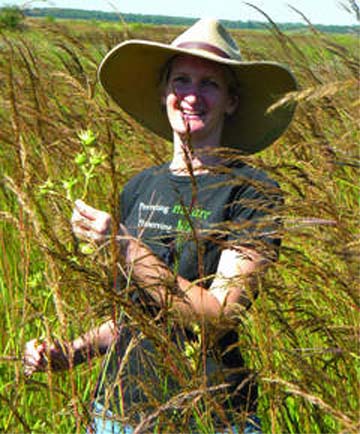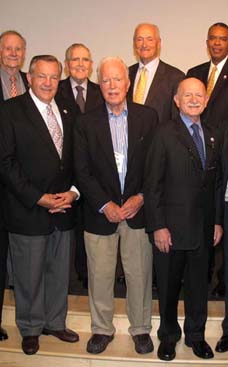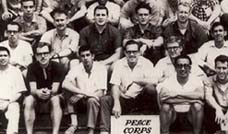
"I was there for almost three years. Bolivia is a very diverse country; it has the Andes Mountains, but half of the country is Amazon rain forest. Other portions are valleys and scrub forests. Packing for the Peace Corps, you're only allowed two suitcases and you don't know where you're going to end up. I was sent where it was hot and humid. The indigenous people I worked with were already very good gardeners, but we helped them to diversify their crops; they grew mostly corn. Not only is it unhealthy to eat nothing but corn every day, it also isn't healthy economically if corn prices are bad. Yucca is a starchy root native to that area, so we grew more of that and also planted a lot more peanuts and sweet potatoes.""
Bolivia RPCV Stephanie Frischie is the plant materials and conservation programs coordinator for the Nature Conservancy's 8,000-acre Kankakee Sands project in northern Newton County Indiana
Jeff Manes: They call the outdoors great for a reason
September 30, 2011 6:10PM
Reprints
Story Image
Stephanie Frischie, 38, is the plant materials and conservation programs coordinator for the Nature Conservancy's 8,000-acre Kankakee Sands project in northern Newton County (Ind.). | Photo provided
Updated: October 2, 2011 2:02AM
"It is now 48 years since I came into these grand prairies. ... As I rode out on my wagon, I thought I had never beheld a country so attractive to the eye. It was covered with the most beautiful blossoms as far as the eye could see; the husbandman had not disturbed them, and they were allowed to grow in their purity.
"Everywhere, we beheld the works of God in nature ... I have been in France and Germany; I was raised in England, but I have never seen anything in those countries that equaled the beauty of this western prairie."
- Thomas Rogers Barker
Tom Barker was describing the Beaver Lake area in what became the northern portion of Newton County when he spoke those words at the Iroquois Old Settlers' Reunion in 1879.
Stephanie Frischie, 38, is a single vegetarian who grew up in Kentland and now lives in an unincorporated area between Mount Ayr, Morocco and Rensselaer. She graduated from South Newton High School and Purdue University in West Lafayette.
Frischie works for the Nature Conservancy's 8,000-acre Kankakee Sands project in northern Newton County. She is plant materials and conservation programs coordinator.
And you can bet your sweet-smellin' Matricaria matricarioides Steph knows the scientific name of every form of flora growing on the property.
***
Are you a farmer's daughter?
"My dad was a vocational agriculture teacher at South Newton High School; he also did some farming."
What was your degree in at Purdue?
"I began as a botany major and graduated with a degree in international agronomy."
Was this your first job after college?
"No, right after college, I was an intern with Pioneer Hybrid at a soybean breeding facility in Napoleon, Ohio. We picked through a lot of beans."
Then what?
"I joined the Peace Corps and was sent to southeastern Bolivia."
Your workmate, Alyssa Nyberg, also was in the Peace Corps.
"Yes, Alyssa was in Nepal while I was in Bolivia; we didn't know each other at the time. Alyssa oversees the nursery and greenhouse, and I harvest the ripe pods and seeds."
Steph, tell me a little more about Bolivia.
"I was there for almost three years. Bolivia is a very diverse country; it has the Andes Mountains, but half of the country is Amazon rain forest. Other portions are valleys and scrub forests.
"Packing for the Peace Corps, you're only allowed two suitcases and you don't know where you're going to end up. I was sent where it was hot and humid."
What were your duties?
"The indigenous people I worked with were already very good gardeners, but we helped them to diversify their crops; they grew mostly corn. Not only is it unhealthy to eat nothing but corn every day, it also isn't healthy economically if corn prices are bad.
"Yucca is a starchy root native to that area, so we grew more of that and also planted a lot more peanuts and sweet potatoes."
Have you been back?
"Many times."
What did you do when you returned to America?
"I worked at a wheat research lab and a sorghum lab. Then, I went back to Bolivia on my own and did some watermelon and potato farming. Then, I came back to Indiana in the summer of 2001 and started volunteering here. Eventually, I became a full-time employee."
When did TNC purchase this land?
"TNC bought the land in Newton County in 1996 and started its first restoration planting in '97."
Steph, are there old-timers who believe this ground should be planted in corn and beans rather than wet prairie or black oak savanna?
"There are as many opinions as there are people. In general, people are polite and respectful, and we can agree to disagree. There are reasons for farming and there are reasons for not farming."
Explain, please.
"This is an area with really sandy soil and a high water table, which is not ideal for corn and soybean production. It is a wonderful habitat for many plants and animals."
You get to work outside a lot, which I know you enjoy, but inside the seed barn is really cool, too. It sure smells good in there with all the different seed heads and pods. Tell me about the machinery you have in there.
"We have a hammer mill, a stationary thresher and two fanning mills that still are made by the A.T. Farrell Co."
What are your major tasks?
"I determine the plants that are native to this area and get them to grow here. That involves a lot of research and visiting other local remnants or preserves. I also collect the seeds and get them ready. We're primarily here for conservation purposes, but the property is open to the public for hiking and nature."
How many threatened or endangered species of flora and fauna are thriving at Kankakee Sands?
"More than 130 species."
That's remarkable. How long can a seed remain in the soil and still germinate if given the chance?
"Some seeds don't live very long at all; they need to germinate and become a plant. But there are some seeds that can last in the soil for decades."
What are a few of the state-endangered or threatened species of animal life found at Kankakee Sands? Common names, please.
"The Henslow's sparrow, the plains pocket gopher, and we have something that's really neat called a slender glass lizard. It's a legless lizard that looks like a snake; it thrives in sandy soils and black oak savannas. We also have many types of insects. Certainly, one of the most spectacular is the regal frittilary."
My friend, Patty Wisniewski, got one on film a couple months ago; it was flitting among the wild flowers on TNC property near the seed barn - beautiful butterfly.
"The caterpillars of the regal frittilary will eat only the leaves of violet plants. We've planted a lot of violets here."
Rare plants?
"We have the Carolina woolly white or old plainsman on the property. Some of our St. John's wort species are really rare. It's always fun to find a rare plant that you've read about or heard about. It's probably like a bird watcher spotting a bald eagle for the first time."
***
One-tenth of 1 percent of the world's black oak savanna remain today.
Thomas Rogers Barker is considered the father of Newton County; he died in 1899. Some say he wasn't meant for the 20th century.
But I like to think Barker is smiling down on the Kankakee Sands from that big blue stem and blazing star-filled prairie in the sky.
And, in my reverie, I envision him nodding his head in approval regarding the restoration work being done by the likes of Stephanie Frischie in the 21st century.
















